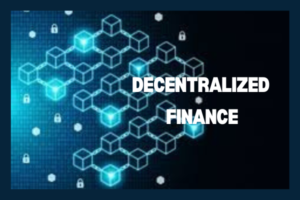
What is Decentralized Finance (DeFi)?
Decentralized Finance, commonly known as DeFi, refers to a set of financial applications and services built on blockchain technology, primarily on Ethereum. Decentralized Finance is a new technology whereby users interact as peers with algorithms or smart contracts rather than through traditional intermediaries such as banks, brokerages or insurance companies. The technology has the potential to transform finance as we know it.
It solves key problems in traditional finance such as lack of inclusion, inefficiency, opacity, centralized control and lack of interoperability.Decentralized Finance (DeFi) represents a revolutionary shift in the financial landscape, leveraging blockchain technology to create an open and inclusive financial system. By eliminating traditional intermediaries and utilizing smart contracts, DeFi aims to democratize access to financial services and enhance transparency.
Core Components of DeFi:
- Smart Contracts: These automated contracts facilitate, verify and enforce transactions without intermediaries.
- Decentralized Applications (dApps): Software applications that run on blockchain networks, providing various financial services.
- Liquidity Pools: Collections of funds locked in smart contracts that provide liquidity to decentralized exchanges and lending platforms.
- Stablecoins: Cryptocurrencies pegged to traditional assets like the US dollar designed to provide stability in the volatile crypto market.
Opportunities in DeFi
DeFi is an umbrella term commonly used to describe a variety of services in crypto-asset markets that aim to replicate some functions of the traditional financial system while seemingly disintermediating their provision and decentralising their governance.
DeFi presents several transformative opportunities that could reshape the financial ecosystem:
Financial Inclusion:
- Access to Services: DeFi platforms are open to anyone with an internet connection which enable access to financial services for the unbanked and underbanked populations worldwide.
- Global Reach: Users from different countries can participate in global financial markets without the need for traditional banking infrastructure.
Transparency and Security:
- Open Source Code: Most DeFi protocols are open-source, allowing anyone to inspect the code, identify vulnerabilities and ensure transparency.
- Immutable Records: Blockchain technology provides an immutable ledger, ensuring that all transactions are recorded and cannot be altered.
Innovation and Customization:
- Programmable Finance: DeFi allows for the creation of innovative financial products and services that can be customized to meet specific needs and preferences.
- Interoperability: DeFi protocols are designed to work together, enabling the creation of complex financial instruments and ecosystems.
DeFi provide Lower Costs and Efficiency:
- Reduced Fees: By eliminating intermediaries, DeFi platforms can offer lower transaction fees and more efficient processes.
- 24/7 Availability: DeFi services operate around the clock, providing continuous access to financial products and services.

What are Risks and Challenges in DeFi
While DeFi offers numerous benefits, it also presents several risks and challenges that must be carefully considered:
1. Smart Contract Vulnerabilities:
In attempting to replicate some of the functions of the traditional financial system, DeFi inherits and may amplify the vulnerabilities of that system. This includes well-known vulnerabilities such as operational fragilities, liquidity and maturity mismatches, leverage, and interconnectedness.
- Code Bugs and Exploits: Smart contracts are susceptible to coding errors and vulnerabilities that can be exploited by malicious actors. High-profile hacks and exploits have demonstrated the risks associated with imperfect code.
- Lack of Recourse: In the event of a smart contract failure or exploit, users often have limited recourse or avenues for recovery.
2. Regulatory Uncertainty:
- Legal Ambiguity: The regulatory status of DeFi platforms and tokens remains uncertain in many jurisdictions, creating legal and compliance challenges.
- Potential Regulation: Governments and regulators may impose new rules and restrictions on DeFi activities, impacting the operations and legality of certain platforms.
3. Market Risks:
- Volatility: The DeFi market is highly volatile with prices of tokens and assets fluctuating significantly. This can lead to substantial financial losses for investors.
- Liquidity Risks: DeFi platforms rely on liquidity pools, which can be subject to sudden withdrawals or changes in liquidity, affecting the stability of services.
4. Security and Privacy Concerns:
- Phishing and Scams: The DeFi space is susceptible to phishing attacks, scams, and fraudulent schemes targeting unsuspecting users.
- Privacy Issues: While blockchain transactions are transparent, they are also publicly accessible, potentially raising concerns about privacy and data security.
How to Navigate the DeFi Space
To effectively navigate the DeFi space and mitigate risks, we can consider the following strategies:
Research and Due Diligence:
- Understand the Technology: Familiarize yourself with the underlying technology and mechanisms of DeFi platforms before using or investing in them.
- Evaluate Projects: Assess the credibility and track record of DeFi projects, including their development teams, security audits, and community feedback.
Diversification:
- Spread Risk: Diversify your investments across multiple DeFi platforms and assets to reduce exposure to any single project or asset.
- Use Reputable Platforms: Stick to well-established and reputable DeFi platforms with strong security measures and a history of reliable performance.
Stay Informed:
- Follow Updates: Stay updated on developments in the DeFi space, including new projects, regulatory changes, and security issues.
- Engage with the Community: Participate in DeFi communities and forums to gain insights, share experiences, and learn from others.
Practice Caution:
- Start Small: Begin with smaller investments and gradually increase exposure as you gain experience and confidence in the DeFi space.
- Use Security Tools: Employ security tools such as hardware wallets and two-factor authentication to protect your assets.
By understanding the potential benefits and risks of DeFi, and by adopting prudent strategies for navigation, individuals and businesses can harness the advantages of this emerging technology while mitigating its challenges. As the DeFi ecosystem continues to evolve, staying informed and exercising caution will be key to successfully engaging with this dynamic and rapidly changing space.
